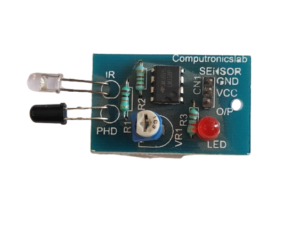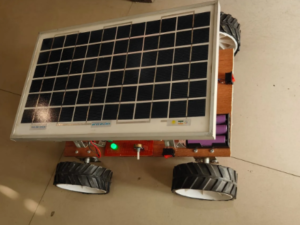Third Eye for Blind project using Lilypad and Ultrasonic Sensor
1 in stock
The Third Eye for Blind project is a wearable device designed to assist visually impaired individuals by providing obstacle detection and navigation support. Utilizing the Lilypad Arduino board and ultrasonic sensor, this project helps users avoid obstacles by alerting them through vibrations or sounds.
₹2,950.00 ₹3,068.00 (Incl. GST)
1 in stock
Third Eye for Blind Project Using Lilypad and Ultrasonic Sensor
Overview:
The Third Eye for Blind project is a wearable device designed to assist visually impaired individuals by providing obstacle detection and navigation support. Utilizing the Lilypad Arduino board and ultrasonic sensor, this project helps users avoid obstacles by alerting them through vibrations or sounds.
Components:
- Lilypad Arduino Board:
- A flexible, sewable microcontroller board designed for wearable electronics. It enables integration into clothing and other fabrics.
- Handles sensor data processing and controls the output for feedback.
- Ultrasonic Sensor (HC-SR04):
- Measures the distance to obstacles using ultrasonic waves.
- Provides real-time distance information to the Lilypad board.
- Vibration Motor or Buzzer:
- Alerts the user of obstacles through vibrations or sound signals.
- Provides feedback when an object is detected within a certain range.
- Battery:
- Powers the Lilypad Arduino and ultrasonic sensor.
- Ensures portability and wearability of the device.
- Conductive Thread:
- Used to connect the components in a wearable format.
- Enables the integration of electronics into clothing.
How It Works:
- Obstacle Detection:
- The ultrasonic sensor emits sound waves and measures the time taken for the waves to reflect back from an obstacle.
- It calculates the distance to the nearest object based on the speed of sound.
- Data Processing:
- The Lilypad Arduino receives the distance data from the ultrasonic sensor.
- It processes this data to determine if the distance falls below a predefined threshold, indicating an obstacle is nearby.
- Feedback Mechanism:
- If an obstacle is detected within the threshold range, the Lilypad activates the vibration motor or buzzer.
- The user receives immediate feedback through vibrations or sound alerts, helping them navigate around obstacles.
- Wearable Integration:
- The components are sewn into a wearable garment, such as a vest or belt.
- The Lilypad Arduino and ultrasonic sensor are securely attached, with connections made using conductive thread.
Implementation Steps:
- Design the Circuit:
- Connect the ultrasonic sensor to the Lilypad Arduino using conductive thread.
- Integrate the vibration motor or buzzer with the Lilypad to provide feedback.
- Programming:
- Write code for the Lilypad Arduino to read data from the ultrasonic sensor.
- Implement logic to trigger the vibration motor or buzzer based on distance measurements.
- Assemble the Device:
- Sew the Lilypad Arduino, ultrasonic sensor, and feedback components into a wearable garment.
- Ensure all connections are secure and the device is comfortable to wear.
- Testing and Calibration:
- Test the device to ensure it accurately detects obstacles and provides appropriate feedback.
- Calibrate the sensor and feedback mechanism to suit the user’s needs and preferences.
Benefits:
- Enhanced Mobility: Helps visually impaired individuals navigate their environment more safely by detecting obstacles.
- Wearable Design: Integrates seamlessly into clothing, providing a non-intrusive aid.
- Real-Time Feedback: Provides immediate alerts to help users avoid collisions.
Conclusion:
The Third Eye for Blind project combines the Lilypad Arduino and ultrasonic sensor to create an effective assistive device for visually impaired individuals. By detecting obstacles and providing feedback through vibrations or sound, this wearable technology enhances mobility and safety for users.
| Weight | 0.00 kg |
|---|---|
| Dimensions | 0.00 × 0.00 × 0.00 cm |





